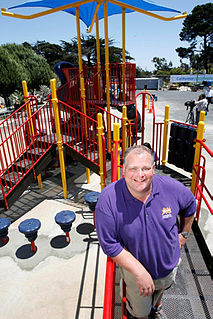A Quote by Anna Lappe
To argue that we need some technology in order to produce food to tackle hunger is completely blind to the facts on the ground. Actually, what we need is the exact opposite of what GMOs give us. We have to empower farmers to grow food for themselves and plant and grow their own seeds and use practices to deal with weeds and the need for fertility, not from purchased products like a seed or a chemical, but from their own farms, from their own knowledge and skill sets.
Related Quotes
All communities, and low-income communities especially because of food insecurity and lack of access to healthy foods, need more farmers markets, need more community gardens and urban farms. It would be great if people living in communities had the tools and resources to grow food in their own backyard - community-based food systems.
The traditional farm, the peanuts, the cotton, the corn, is probably not the thing to do, because you're up against big farmers who can afford all the equipment to grow those kinds of crops. But we need healthy food. We're being encouraged to eat more vegetables. Our school systems are being encouraged to buy locally. So, we need farmers who can produce that food.
We have to understand that we want to pay the farmers the real price for the food that they produce. It won't ever be cheap to buy real food. But it can be affordable. It's really something that we need to understand. It's the kind of work that it takes to grow food. We don't understand that piece of it.
There's also a growing trend toward having gardens in schools to literally show kids where food comes from by having them grow and prepare their own food. There's also a movement that's bringing farmers into schools and creating relationships between local farms and local cafeterias, so that instead of frozen mystery meat, you have fresh produce that's coming from the area that has a name and a face associated with it.
For example, they have land. The government of Qatar wants to lease the Tana River delta, which is in Kenya, from the Kenyan government, so that they can produce food there. People in Kenya need food. We have people who have studied agriculture. Why is it that if we really need food, we cannot go into the delta and develop our own food?
Some kids have never seen what a real tomato looks like off the vine. They don't know where a cucumber comes from. And that really affects the way they view food. So a garden helps them really get their hands dirty, literally, and understand the whole process of where their food comes from. And I wanted them to see just how challenging and rewarding it is to grow your own food, so that they would better understand what our farmers are doing every single day across this country and have an appreciation for ... that American tradition of growing our own food and feeding ourselves.
I believe that virtually everyone has the ability to either grow some food at home, or to find an appropriate location to start a garden. I may sound like a kook who plants my landscape with cucumbers instead of carnations, peppers instead of petunias, and fruit trees rather than ficus, but I am convinced that wherever you go, you can grow food! Now is the time for us to join together and plant the seeds that will transform the places in which we live.
where families suffer from disasters that are preventable, this is a measure of a whole nation's neglect. A society imperils its own future when, out of negligence or contempt, it overlooks the need of children to be reared in a family ... or when, in the midst of plenty, some families cannot give their children adequate food and shelter, safe activity and rest, and an opportunity to grow into full adulthood as people who can care for and cherish other human beings like themselves.
I describe what is happening as 'food fascism' because this system can only survive through totalitarian control. With patents on seed, an illegitimate legal system is manipulated to create seed monopolies. Seed laws that require uniformity - which criminalize diversity and the use of open-pollinated seeds - are fascist in nature. Suing farmers after contaminating their crops, [...] is another aspect of this fascism. Pseudo-hygiene laws that criminalize local, artisanal food are food fascism. And attacks on scientists and the silencing of independent research [...] are examples of knowledge fascism.
Children, not a grain of the food we eat is made purely by our own effort. What comes to us in the form of food is the work of others, the bounty of Nature and God's compassion. Even if we have millions of dollars, we still need food to satisfy our hunger. Can we eat dollars? Therefore, never eat anything without first praying with humility.
I'm typically a 'just drink water' kind of guy. I was a bodybuilder in high school, so I used to - food to me was, 'there are this many grams of carbohydrates and proteins, and I need these micronutrients in order to grow and be fit,' and I ate in order to live and not live in order to eat, and I think most people are the opposite.



































